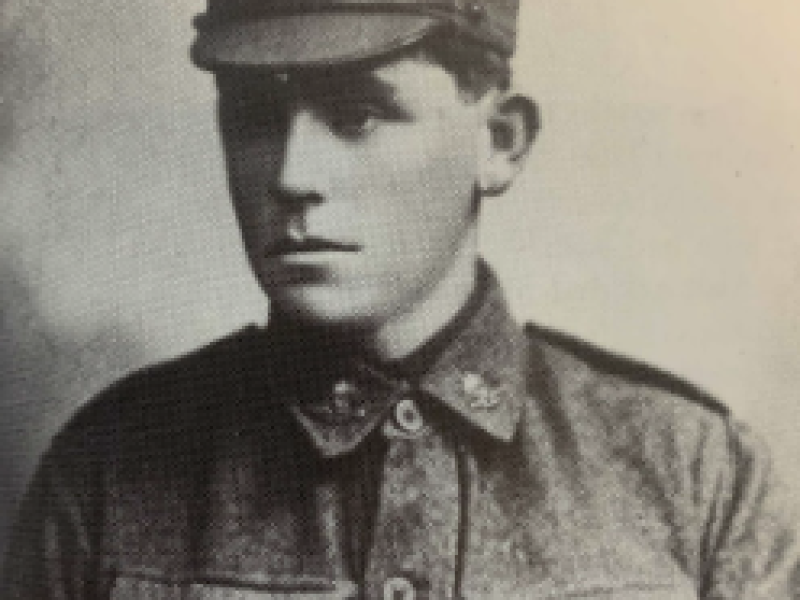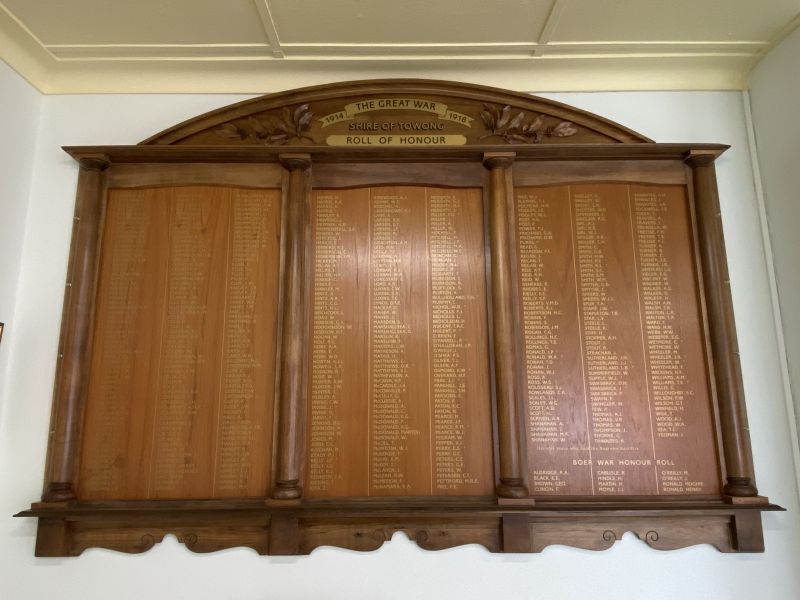John Jackson Park
Jack was born on the 14th of September 1895 at Running Creek, Victoria, approximately 40 kilometres north of Mt Beauty. He was one of ten children of John Thomas and Ada Adelaide (née Franks) Park.
The Park family ran a dairy farm at Talgarno. Times were tough and the family went through some bad times. In 1914 Australia was in the grip of drought, with very little feed for the Park’s dairy herd. The cold winter took its toll and of a herd of 52 cows, only one survived. In Karen and Laurie Coulston’s book “The descendants of Mary & Mary Coulston in Australia, 1861-1984” the following story is told;
“In the same drought their mother used to make thick porridge and put it on an enamel plate to set overnight. In the morning raspberry jam was spread on it and cut into triangles for the children to take to school for lunch.”
Jack enlisted at Melbourne on the 14th of January 1916. He was allocated the Regimental Number 639 and placed in the B Company of the 38th Battalion at Bendigo. Whilst stationed at the Bendigo Camp he started experiencing headaches, backaches and shortness of breath. He was diagnosed as having cerebro spinal meningitis. Jack spent two months in the Bendigo Hospital. On the 13th of September the doctors at the hospital recommended that he spend more time convalescing at the Macleod Repatriation Hospital at Mont Park in Victoria, after which he would be discharged.
Eight months later, Jack re-enlisted. His Regimental Number became 4873 and he was assigned to the 13th Reinforcements for the 38th Battalion. After initial training at Broadmeadows camp near Melbourne, the 13th Reinforcements embarked on HMAT A20 Suevic at Melbourne on the 21st of June 1917. Almost nine weeks later they disembarked at Liverpool. Jack spent nearly two months at Hurdcott attached to the 8th Training Battalion and a further five weeks at Codford training with the 15th Training Battalion.
On the 18th of December 1917 the 13th reinforcements for the 38th Battalion embarked on a steamer at Southampton and proceeded to France to join their battalion. The following day they arrived at the Australian Infantry base Depot at Rouelles and on Christmas were finally attached to the battalion.
In early February Jack was admitted to the 10th Field Ambulance suffering from high temperatures. He was diagnosed as having pyrexia and was passed up the medical chain to the 1st Australian Casualty Clearing Station and then, on the 16th of February, the 54th General Hospital. His condition was serious enough for him to be transferred to England via the Hospital Ship St. Dennis. Three weeks were spent in the Brook War Hospital at Woolwich. On the 1st of May he was transferred to the 3rd Auxiliary Hospital at Dartford where his prognosis was changed to trench fever. Jack would not rejoin his unit in France until the 10th of July 1918. At this stage the 38th Battalion was billeted near Allonville, outside of Amiens.
In early August the Allied armies were preparing for an offensive to be launched on August the 8th. On this day the 38th Battalion was in reserve and didn’t play an active role. Two days later the 10th Brigade (of which the 38th was part) was ordered to participate in the capture of the village of Proyart. On the approach to their starting off positions the Australians were bombed by a German aircraft and then halted by heavy German machine-gun fire. Six tanks that were moving forward with the troops were subjected to anti-tank gun and rifle fire. Just prior to dawn the column withdrew.
In late October John and Ada received a letter from Private E.J. Nowlan, a friend of Jacks. The letter was printed in the 31st of October, 1918, edition of the Upper Murray and Mitta Herald.
“Dear Mr and Mrs Park, - Just a few lines to express my deepest sympathy in the loss of your loving son Jack, who was killed in action on August 10. Jack had just returned from England and joined us before-hand, and he had been acting as an assistant to our Company quarter-master. On the evening that we went into the line, Jack asked to be allowed to go to his old platoon, No 6, and it was while we were advancing that poor Jack was killed. We had to take shelter, as the shells were falling fast. It was while Jack and another lad, Private George Gibson, and three more of us, were taking shelter when a shell fell about 8ft away, killing poor Jack instantly; George was fatally wounded, and another lad was hurt. Jack was a good lad and a good soldier. He died with his rifle in his hand. He was very much liked by all his officers and company comrades. I collected Jack’s private papers, and the quarter-master is forwarding them onto you. I saw Jack buried where he fell; he had a full military service read over his grave by the battalion chaplain. While we were all in England we decided to leave our ? wallets in England; so Jack, Charles Irvine, Laurie Swift and myself sent our books to Laurie Swift’s auntie. As soon as I get leave, I will forward home poor Jack’s books. All the lads in the company and Jack's platoon commander (Wm. Sanderford) wish me to express their deepest sympathy to you in your bereavement. I also want you to express to Jack's young lady my deepest sympathy in her loss of a good, true and loved sweetheart. I had known Jack since the day that he entered Broadmeadows camp. Jack is in the photo of twelve lads taken in Hurdcott camp while we were in isolation after coming off the boat. -
Yours, sinc., Private E.J. Nowlan.”
The sweetheart referred to in the letter was most likely Miss Phyllis Elsie Field of “Hillside”, Arnold Street, Bendigo. In Jack's service file there is a letter written by Phyllis, dated the 13th of January 1919, where she asks for details about Jack.
“... Could you please tell me if the above soldier has been killed in action and if so on what date. Today I received a letter which I had written to private John J Park, abroad, returned and marked deceased.
An early reply will greatly oblige …”
We can’t imagine how Phyllis was feeling when she received her letter, returned to her, with the stamp “DECEASED” across it. Research has found that Phyllis did not marry throughout her life
Jack was buried in Heath Cemetery at Harbonnieres, France. He is also remembered on the Australian War Memorial Roll of Honour, and the Towong Shire Boer War and WW1 Roll of Honour. For his service during the war he was awarded the British War Medal, and the Victory Medal.

 Stephen Learmonth
Stephen Learmonth